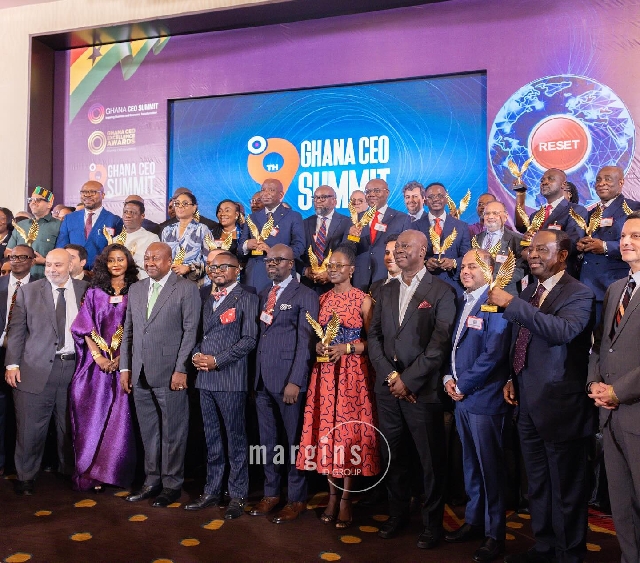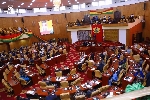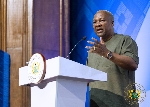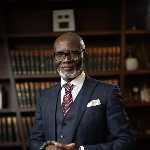Margins Group advocates digital identity as key driver of Ghana’s economic transformation
 Mr Moses Baiden in a group photograph with President Mahama
Mr Moses Baiden in a group photograph with President Mahama
Chief Executive Officer of Margins Group, Mr Moses Kwesi Baiden Jr., delivered a compelling keynote address at the 9th Ghana CEO Summit held in Accra on Monday, May 26, 2025 underscoring digital identity as the foundational engine for Ghana’s economic reset and long-term transformation agenda.
Speaking on the theme “Digital Identity for Business and Economic Reset: Empower Ghana’s Transformation Agenda,” Mr. Baiden highlighted how secure and verifiable digital identity systems are central to driving inclusive economic growth, improving governance, and enabling trusted, data-driven decision-making.
In attendance were President John Dramani Mahama, the Governor of the Bank of Ghana Dr. Johnson Pandit Asiama, and a host of distinguished CEOs, policymakers, and business leaders.
Mr. Baiden described digital identity as more than just a card or a number, calling it “the passport for effective participation in the modern economy.”
He noted that in today’s data-driven, trust-based global landscape, the ability to verify identity securely and instantly is critical for accessing services—from banking and healthcare to e-commerce and cross-border trade.
“Digital identity is not just about identification; it is about empowerment, economic acceleration, and trust at scale,” he said. “It gives every citizen a voice, every business a customer, and every country a chance to leapfrog.”
He stressed that for Ghana to build a 24-hour economy and create jobs, as envisioned by national leaders, it must ensure every citizen possesses a secure, multi-functional identity that works seamlessly both online and offline.
Tracing the global evolution of industrial revolutions, Mr Baiden noted that the Fourth Industrial Revolution—characterised by artificial intelligence, big data, blockchain, and intelligent systems—relies on accurate, secure, and trusted data.
“And trusted data begins with a trusted digital identity,” he emphasised.
He warned that without robust identity systems, nations remain vulnerable to fraud, impersonation, and inefficient governance.
“Trust, delivered at digital speed, is the currency of this new economy. And Ghana is ready,” he declared confidently.
Mr Baiden showcased the Ghana Card and the National Identification System as a “proven, multi-purpose, secure digital identity infrastructure” with enormous impact.
He praised the National Identification Authority (NIA) for registering over 98% of Ghana’s adult population and beginning the assignment of Ghana Card numbers at birth.
“This creates a continuous identity trail from birth to death and enables real-time demographic intelligence,” he said.
Through this system, Ghana can now monitor births, deaths, population movements, household composition, and other key indicators—data previously inaccessible or estimated.
The CEO illustrated how digital identity has already revolutionised government efficiency and revenue generation.
The integration of the NIA with the Ghana Revenue Authority (GRA) significantly enhanced tax collection, with revenue rising from GH₵75.71 billion in 2022 to GH₵153.5 billion in 2024—a 103% increase over two years.
He attributed this success to improved taxpayer identification, digitised filing systems, and reduced evasion.
The Ghana Card now serves as a unique access point for tax filings, boosting public compliance and easing administration.
Mr Baiden also noted that trusted identity enables precision-targeted social interventions, smarter infrastructure planning, better market segmentation for businesses, and more inclusive access to financial and public services
Concluding his address, Moses Baiden urged government and private sector leaders to treat digital identity as a national strategic asset. “Identity is the great enabler. It strengthens institutions, empowers individuals, and unlocks economic potential,” he said.
He called for continued investments in identity systems that meet international standards, ensure privacy and security, and support interoperability across sectors.
“The future belongs to nations that can deliver trust at digital speed,” he concluded.
The address was met with widespread approval from the business community and policymakers, with many describing it as a timely blueprint for leveraging technology to transform Ghana’s economy.
Source: Classfmonline.com/Cecil Mensah
Trending News

W/R: NAiMOS launches major operation in Cape Three Points Forest Reserve, arrests illegal Miners, destroys equipment and drugs
09:06
NPP 2026 Primaries: Kwabena Agyei Agyepong remains a qualified aspirant, campaign teams clarifies
19:47
Renewables overtake coal as world's biggest source of electricity
16:39
Speaker Bagbin postpones commencement of Parliament’s third meeting
16:38
PAJAG applauds President Mahama for strengthening collaboration with CSOs in fight against galamsey
09:06
Junior Doctors' Association of Ghana to withdraw all outpatient and emergency services October 7
11:50
Dzata Foundation hosts youth mental health engagement to mark World Mental Health Day 2025
09:00
Interior Minister warns against attacks on security personnel as Eastern Regional Security Command is inaugurated
15:48
Ashanti Regional MPs react to allegations of opting for community roads instead of flyovers
14:38
GA/R: Tension in Weija-Gbawe as MCE enforces sanitation laws after clean-up exercise
13:51




